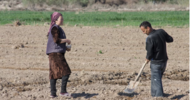The Egyptian external agricultural land deals are all the more fragile as a future government or policy change in Ethiopia or Sudan risks destabilizing their external food security strategy.
- Afrik News
-
14 October 2010
Japan should shun this new kind of colonization like a plague, no matter what well-paid city-based officials may say.
- Japan Times
-
04 April 2010
Commercial farming, with its vast tracts of land, is running into problems in Ethiopia’s Gambella region – and local communities are reaping few benefits
Karuturi Global faces accusations of causing floods to local villages, not paying taxes, contributing to human rights violations and providing dismal working conditions at its farming operations in Gambela, Ethiopia.
Ethiopian prime minister Hailemariam Dessalegn has denied that the government is forcing tens of thousands of people off their land in order to lease it to foreign investors.
- Sudan Tribune
-
21 April 2013
Faced with reports of land grabbing by Indian companies in some African countries, especially Ethiopia, the government says the Indian companies have taken land on lease as per rules of the country concerned.
- The Hindu
-
31 January 2013
Desperate for foreign investment and the promise of development, African governments are increasingly offering to foreigners what their people rely on most—land
- Epoch Times
-
21 September 2011
The company plans to lease land to grow palm oil, sugar cane and cereals in Tanzania, to add to land it has acquired in Ethiopia. Karuturi is visiting Tanzania, Uganda and Ethiopia as part of a delegation of 35 Indian investors.
Saudi Arabia is attempting to strengthen its position in what seems certain to be a growing competition for food among the nations of the Middle East.
- Council on Foreign Relations
-
27 April 2010
Indian firms have signed land deals in Ethiopia, Kenya and Madagascar to produce a range of food crops for export to India.
Saudi Star Agricultural Development Plc, an Ethiopian company owned by billionaire Mohamed al-Amoudi, said it plans to invest $100 million in a rice farm in western Ethiopia next year to kick-start the stalled project.
- Bloomberg
-
03 December 2014
Land grabbing poses no harm on the environment or on the local community, says Saudi billionaire Sheik Mohammed Hussein Al-Amoudi who is seeking to expand his farmland in Ethiopia from 10,000 hectares to 250,000 hectares.
- Afrik News
-
17 February 2011
Grow Africa executive director William Asiko dismisses concerns about large-scale land grabbing in Ethiopia as "perceptions".
- howwemadeitinafrica.com
-
23 June 2016
Karuturi Global Ltd, the Indian multinational that made its name in the global cut flower industry and recently acquired more than 300,000 ha in Ethiopia to produce food, is continuing its painful and massive decline.
- TJN et al
-
09 October 2014
Karuturi expects to acquire 311,700 ha of land in Tanzania that is similar to Ethiopia and has already applied for 1000 ha of land at Rufiji Basin, Coast Region.
What happens when you are forced to leave the land that has fed your family for generations? What is the impact of wealthy foreigners having access to the best agricultural land in a very poor country? These questions addressed in new Guardian film.
Scholar and employee of the UN Economic Commission for Africa, Atkyelesh G.M. Persson, recommends that the government, private sector and academia further investigate the potential damages large scale farms have perpetrated in Ethiopia and beyond.
- The Reporter
-
10 August 2019
Eight years after releasing its first report on land grabbing, GRAIN publishes a new dataset documenting nearly 500 cases of land grabbing around the world.
World Bank organizes costly conferences on land governance while overlooking the forced relocation of farmers and indigenous people resulting from its policies and programs.
- Oakland Institute
-
14 Mar 2016
Even the World Bank admits that the vast bulk of foreign investment in Africa doesn’t help the continent’s people, with aid and agricultural support often a smokescreen for multinationals looting nations’ wealth.
At the heart of the current conflict is the government's development policy and the uncontrolled influx of migrants acquiring lands in the indigenous people’s territories.
Businessman claims 50% of Saudi investors in Ethiopia have left the country, some leaving behind their farms and others selling them. He says many do not want to return for fear of being framed for crimes they did not commit.
- Arab News
-
24 November 2015
As climate change, population growth and environmental damage shrink the amount of arable land on the planet, wealthier countries and corporations look to developing countries for land.
CIFOR scientist argues that failure to accept large-scale farmland investments as a new economic reality in Africa will hold back the development of effective institutional and regulatory frameworks.
According to the data presented by international non-profit Rights and Resource Initiative, Indian companies have acquired 63,000 sq km land, an area almost twice the size of Kerala, in Africa, South America and Southeast Asia.
- Down to Earth
-
29 December 2012
Karuturi Global is now one of the biggest private land owners in the world. They have invested over a quarter of a billion dollars in Ethiopia and Kenya alone. BBC reports.
A new scramble for Africa is under way. As global food prices rise and exporters reduce shipments of commodities, countries that rely on imported grain are panicking. Affluent countries like Saudi Arabia, South Korea, China and India have descended on fertile plains across the African continent, acquiring huge tracts of land to produce wheat, rice and corn for consumption back home.
For the sake of peace and future development cooperation, the nations of the Nile River Basin should come together to ban land grabs by foreign governments and agribusiness firms, writes Lester Brown
- New York Times
-
01 June 2011
Ethiopia's agriculture ministry put an advertisement in its website for 180,625 hectares along the Omo River in southern Ethiopia.
- TradeInvest Africa
-
17 November 2009
One final straw for the German company which owns 70,000 ha of land in Oromia has put a definitive end to its Ethiopian adventure.
- Africa Intelligence
-
22 September 2017















